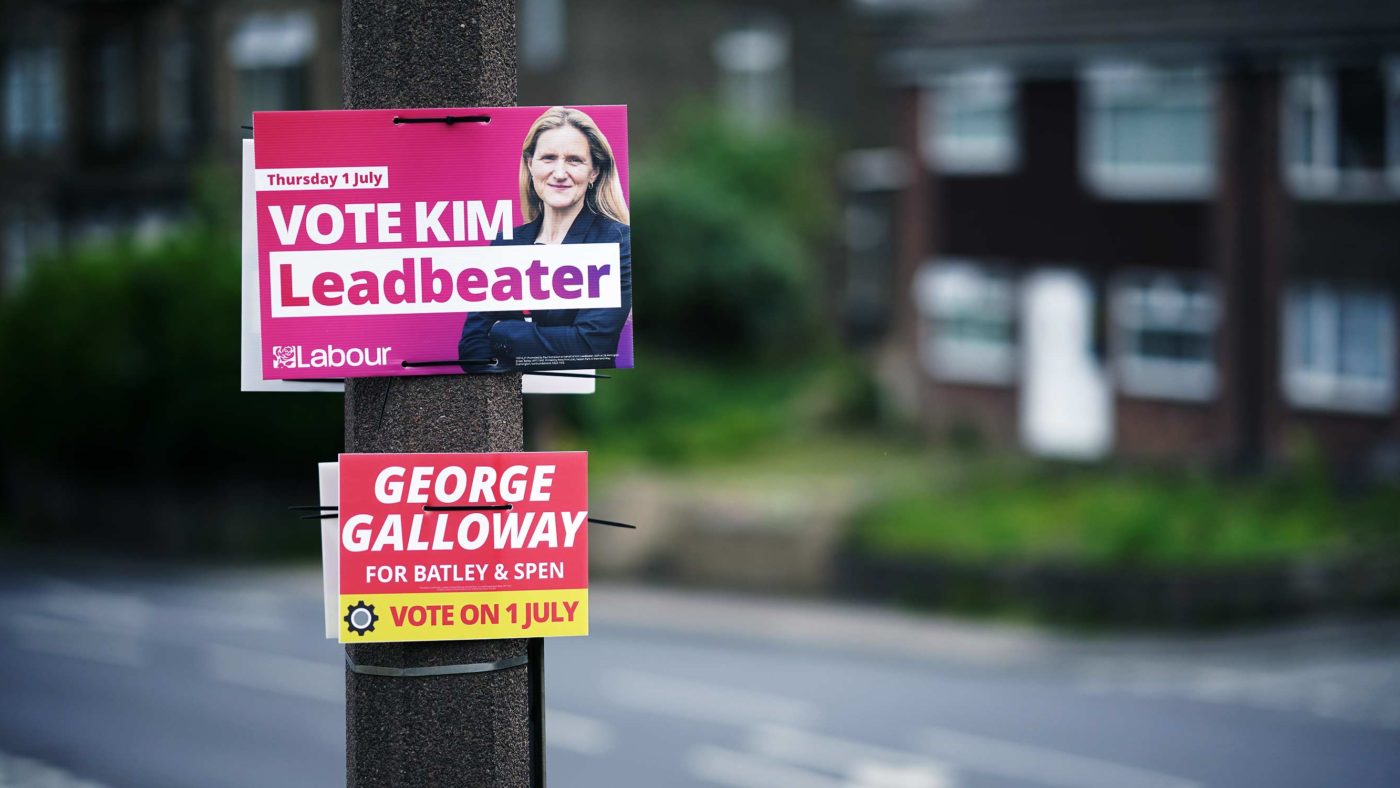The build-up to this Thursday’s Batley and Spen by-election has descended into grubby communalism and ugly sectarianism, with an unfortunate dose of political harassment and intimidation.
In truth, it is exactly what I feared – considering the Labour Party’s general direction of travel and more so after left-wing perennial provocateur George Galloway threw his hat in the ring. The moment he did, the Israeli-Palestinian conflict and India-Pakistan tensions over Kashmir were going to be elevated as ‘key issues’ in a leftist tussle between Galloway’s Workers Party of Britain (WPB) and the aggressively identitarian elements of the Labour Party, in their competition for the ‘British Muslim vote’ in the constituency.
Of course, this is not to say that foreign policy issues should not feature at all in British political campaigning. Britain is an influential and well-respected actor on the international stage, and it has a multi-ethnic population where people have enduring ties with countries in different parts of the world. But what will concern many is the degree to which foreign geopolitical conflicts in the Middle East and communal tensions in South Asia have dominated electoral campaigns for a by-election in West Yorkshire.
Galloway’s intervention in this by-election has evidently left Labour in a state of pure desperation. It’s quite something to see Her Majesty’s official opposition distributing campaign literature attacking the Prime Minister for maintaining diplomatic relations with India. There is a difference between raising perfectly legitimate concerns over the behaviour of foreign regimes and opportunistically stoking communal divisions in the hope that it delivers votes – and Labour is certainly guilty of the latter. Whether Kim Leadbeater personally approved of the leaflets is unclear, but at best it suggests a total lack of control over the party’s messaging. In an era when anything local can go viral and become national news, that’s simply not good enough. The fact that both Labour Friends of India and one of the party’s own MPs, Navendu Mishra, have complained about it speaks volumes. Mishra’s tweet is particularly damning, with its complaints of a “hierarchy of racism” in the party, where some ethnic groups are seen as “fair game”.
Playing divide-and-rule between South Asian communities is a fundamental betrayal of the party’s traditions which are rooted in social solidarity and political inclusivity. Instead of focusing on the common good which cuts across such communities – family-orientated values, strong intergenerational cohesion, a sense of civic duty, and viewing faith as a healthy source of resilience and optimism – Labour has decided to ‘play off’ ethno-religious groups such as Kashmiri Muslims and Gujarati Hindus against one another (a trend covered in depth by Guy Dampier here).
Having dragged its reputation for ‘solidarity’ through the mud, Labour no longer has a moral leg to stand on when it accuses the Conservative Party of indulging in ethno-religious identity politics (which was very much the case with Zac Goldsmith’s disgraceful 2016 London mayoral campaign against Sadiq Khan).
Labour’s ‘cultural’ politics reflects how crude sectarian perspectives have taken root in the party. This includes reductively viewing an imagined ‘British Muslim’ community as an oppressed, anti-India, anti-Hindu collective, and the ‘British Indian’ community as a privileged, Hindutva-sympathising, anti-Muslim bloc. This does not ignore or whitewash the very existence of British Indian Muslims but represents a woeful interpretation of community relations in modern Britain – where relations between different South Asian groups in cities such as Leicester and my hometown of Luton are in broadly decent shape. Being of Bangladeshi Muslim origin, I have always had great respect for my supportive Gujarati Hindu and Punjabi Sikh elders in the local community. It is a crying shame that Labour Party political activities have the potential to destabilise such forms of social cohesion and inter-faith harmony.
With the disintegration of Labour’s relationship with British Jewish voters under Jeremy Corbyn’s destructive leadership, it is now in the process of alienating many British Indian voters – especially those who are Hindu. Those on the far left who see aspirational minority voters as somehow ‘selling out’ their ethnic identity should shoulder a good deal of responsibility for the fraying of relations between Labour and British Indian Hindu voters.
This could have fairly immediate electoral consequences too. The last thing Keir Starmer needs is another by-election, but with Leicester East MP Claudia Webbe currently suspended by the party after being charged with harassment, there’s at least the possibility of a fresh contest in her Leicester East seat. Here is a Brexit-voting seat with a notable Indian Hindu population, where Labour’s vote share dropped by 16 percentage points in the last general election, while the Tory vote share increased by 14 percentage points. Granted, Labour are still well ahead, but the Tories will certainly be looking at the seat with interest.
Things seem pretty rock bottom for Labour as it is, but could they get worse? You bet.
Click here to subscribe to our daily briefing – the best pieces from CapX and across the web.
CapX depends on the generosity of its readers. If you value what we do, please consider making a donation.


